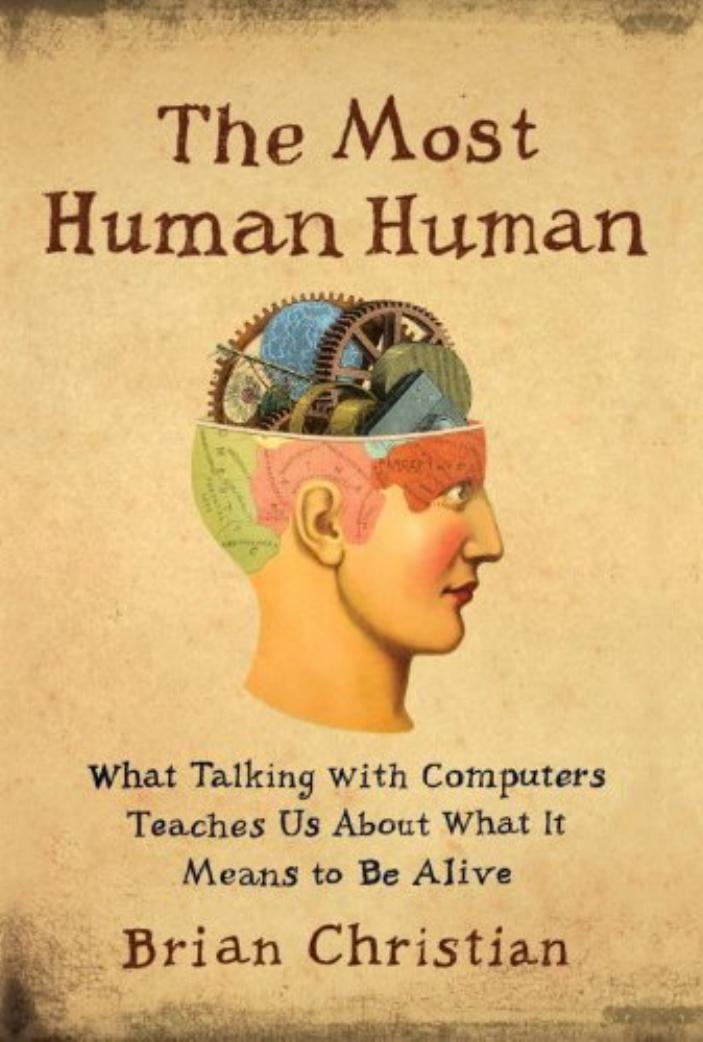The Most Human Human: What Talking With Computers Teaches Us About What It Means to Be Alive by Brian Christian

Author:Brian Christian [Christian, Brian]
Language: eng
Format: mobi, epub, pdf
Tags: Non-fiction, Sociology, Psychology, Science, Philosophy, Contemporary, Adult
ISBN: 9780385533065
Google: zfONjvb9FpIC
Amazon: B004FEG2S6
Barnesnoble: B004FEG2S6
Goodreads: 10575733
Publisher: Doubleday
Published: 2011-03-01T00:00:00+00:00
7. Barging In
Listeners keep up with talkers; they do not wait for the end of a batch of speech and interpret it after a proportional delay, like a critic reviewing a book. And the lag between speaker’s mouth and listener’s mind is remarkably short.
–STEVEN PINKER
Spontaneity; Flow
“Well, I mean, you know, there are different levels of difficulty, right? I mean, one obvious level of difficulty is that, you know, ‘be yourself’ would be an injunction in the first place, right, which suggests, of course, if you have to be told to be yourself, that you could in some way fail to be yourself.” Bernard Reginster, professor of philosophy at Brown University, chuckles. This tickles his philosopher’s sense of humor. “But that’s paradoxical! Because if you’re not going to be yourself, then what else are you going to be? You know? So there’s already something sort of on the face of it peculiar, in the idea that you should be told, or that you could be exhorted, or enjoined, to be yourself—as if you could fail!”
One of the traditional ideas, he says, about what it means to “just be yourself”—the advice and direction that the Loebner Prize organizers give the confederates each year—is to be your true self, that is, “to figure out what your quote-unquote true self is supposed to be, and then [to become it] by peeling away all the layers of socialization, so to speak, and then trying to live your life in a way that would be true to that true self, so to speak.” That philosopher’s tic of putting everything in quotation marks—because to use a word is, in a way, to endorse it—tips Reginster’s hand, and paves the way for the counterargument long before it comes. “Now, the big problem with that idea,” he says, “is that a great deal of fairly recent developmental psychology and a great deal of research in psychiatry and psychoanalysis and so forth has suggested, at least, that the idea that there would be a true ‘you’ that comes into the world unaffected, unadulterated by the influence of the social environment in which you develop, is a myth. That in fact you are, as it were, socialized from the get-go. So that if you were to peel away the layers of socialization, it’s not as if what would be left over would be the true you. What would be left over would be nothing.”
Reginster echoes here Turing’s words in response to the “Lovelace Objection” that computers are incapable of “originality”: How sure are we that we can? They echo, also, Turing’s less confident and slightly more uneasy rhetorical question in that same 1950 paper:
The “skin of an onion” analogy is also helpful. In considering the functions of the mind or the brain we find certain operations which we can explain in purely mechanical terms. This we say does not correspond to the real mind: it is a sort of skin which we must strip off if we are to find the real mind.
Download
The Most Human Human: What Talking With Computers Teaches Us About What It Means to Be Alive by Brian Christian.epub
The Most Human Human: What Talking With Computers Teaches Us About What It Means to Be Alive by Brian Christian.pdf
This site does not store any files on its server. We only index and link to content provided by other sites. Please contact the content providers to delete copyright contents if any and email us, we'll remove relevant links or contents immediately.
| Computer Vision & Pattern Recognition | Expert Systems |
| Intelligence & Semantics | Machine Theory |
| Natural Language Processing | Neural Networks |
Algorithms of the Intelligent Web by Haralambos Marmanis;Dmitry Babenko(7870)
Hadoop in Practice by Alex Holmes(5666)
Jquery UI in Action : Master the concepts Of Jquery UI: A Step By Step Approach by ANMOL GOYAL(5519)
Life 3.0: Being Human in the Age of Artificial Intelligence by Tegmark Max(4524)
Functional Programming in JavaScript by Mantyla Dan(3728)
The Age of Surveillance Capitalism by Shoshana Zuboff(3435)
Big Data Analysis with Python by Ivan Marin(3111)
Blockchain Basics by Daniel Drescher(2900)
The Rosie Effect by Graeme Simsion(2716)
WordPress Plugin Development Cookbook by Yannick Lefebvre(2629)
Test-Driven Development with Java by Alan Mellor(2585)
Hands-On Machine Learning for Algorithmic Trading by Stefan Jansen(2547)
Applied Predictive Modeling by Max Kuhn & Kjell Johnson(2490)
Dawn of the New Everything by Jaron Lanier(2444)
Data Augmentation with Python by Duc Haba(2431)
The Art Of Deception by Kevin Mitnick(2306)
The Infinite Retina by Robert Scoble Irena Cronin(2285)
Principles of Data Fabric by Sonia Mezzetta(2250)
Rapid Viz: A New Method for the Rapid Visualization of Ideas by Kurt Hanks & Larry Belliston(2206)
